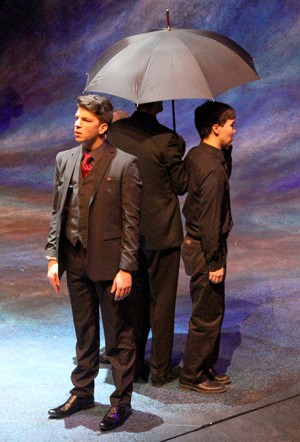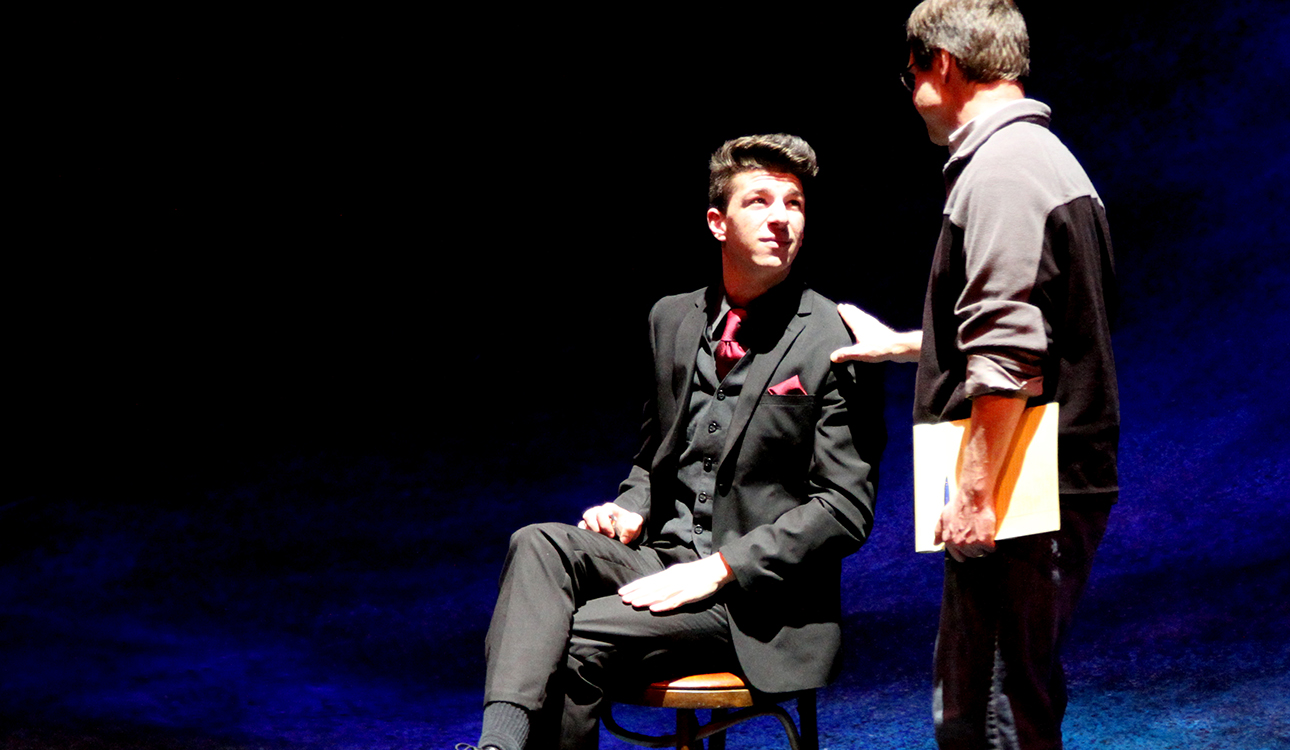
Carlye Thornton | Lariat Photographer
By Ian Currie
Reporter
The smell of wet paint crawls through the air in the Mabee Theater in the Hooper-Schaefer Fine Arts Center. Colors blur and blend into one another on the backdrop, so there is uncertainty as to where horizontal begins and vertical ends.
The stage seems to be a character itself.
This is the scene for the Baylor Theatre’s latest production, “Dead Man’s Cell Phone.”
Steven Pounders, professor of theater arts, directs the modern comedy written by Sarah Ruhl.
“The stage has a heavenly feel,” Cypress senior Alexis German, one of the central performers, said. “It speaks to the grandeur of life, and how small we can be in it. We are just tiny people interacting in a big world.”
Nashville junior Henry Greenberg, who plays the character of the dead man Gordon, said he believes the production raises some intriguing questions.
“What is the life that you are living?” Greenberg said. “The playwright believed that what you seek in the real life is very important in the afterlife.”
Greenberg appears in a number of scenes, including one where he performs a monologue from the afterlife, reflecting on his last day on Earth.
“Through that last day we see who I am,” Greenberg said.
The show does not presume to inform the audience about the afterlife, though.
“We never see too much of the afterlife,” Greenberg said. He said the show does not attempt to answer the questions it raises.
Although his character is only physically alive for about two minutes in the play, Greenberg’s character continues to be a factor in the rest of the production.
This is just one indication of why Denton senior Molly Reed, who plays Gordon’s mother Mrs. Gottlieb, said some questions are redundant when experiencing the production.
“Did that really happen?” Reed said. “In a linear or physical sense that’s a useless question.”
Instead she hopes the audience members will reflect on their own lives.
“What do they think about their relationships, their values and the ‘what’ and ‘how’ they communicate to the other people in their lives. Those are the questions raised,” Reed said.
Pounders described the show as “inconclusive.”
“The beauty of the play is in not having the answers,” German said.
Many of the performers described an emphasis and power resting in the symbols presented in the piece.
Cellphones both ringing and silent, death, afterlife, sacred places and the afterlife are “really fascinating symbols that are interesting to explore with regard to contemporary communication,” German said.
“There are many moments in the play that are surreal, and the images in the play — their connotations — are more important than the story itself,” Pounders said.
Austin senior Jaime Lee continued this thought and said, “It is so much about how we get wrapped up in our cellphones, in what is real and what is not, how we all walk around hunched over our phones.”
Although Lee’s character is non-descript and likened to an Edward Hopper painting — pale, weathered and experiencing the vast emptiness of modern life — she is central to the action and development of the play.
Lee describes the progress of her character in the story as “quite an adventure.”
Pounders said he believes the show will get a positive response, as the theater has sold out most of its shows in the last 10 years.
He said he is excited about the upcoming show. He hopes it will deliver the audience a different experience.
“This is different to the film experience in that there is audience interaction. There is a level of intimacy with the characters that you just cannot attain in a cinema,” Pounders said.
Pounders emphasized that the Baylor production has a unique twist on the original.
Pounders also hinted at the ensemble performing a fascinating “cellphone ballet,” but saved the details for audience members.
Reed surmised the play in one question: “If you were to die in your own backyard today, what would you have liked to have said in your life?”
“Dead Man’s Cell Phone” raises similar questions, and allows the audience to deal with them throughout and after the performance.
“Our communication patterns mean that there are no more sacred places,” said German. “It is sad, but it is true.”
Tickets for the show are on sale now at the Hooper-Schaefer Fine Arts Center Box Office. The only tickets left are for performances on Feb. 15. They sell for $18.
Performances are at 7:30 p.m. Monday through Feb. 15 and at 2 p.m. Feb. 15-16 in the Mabee Theatre at the Hooper-Schaefer Fine Arts Center.






